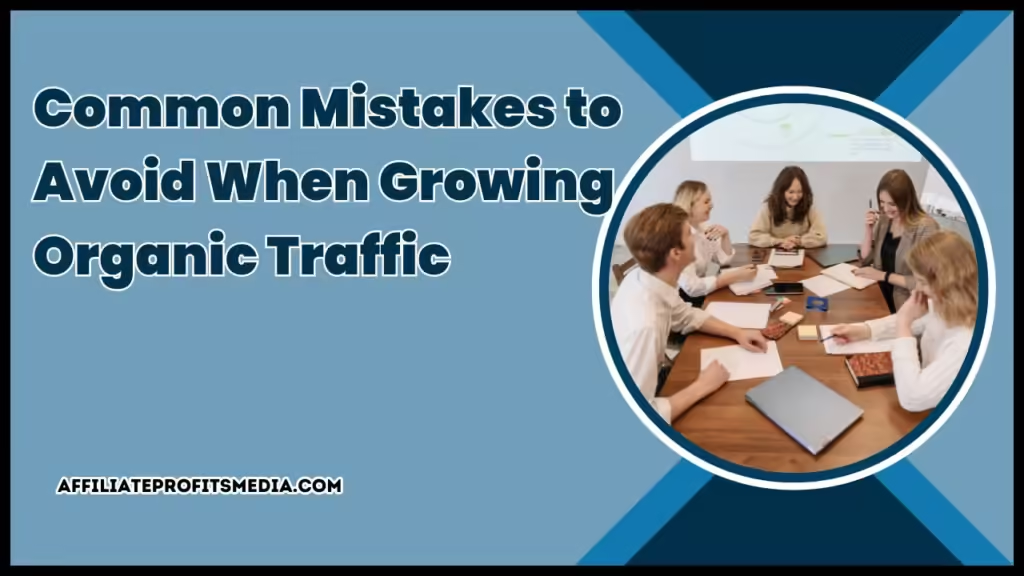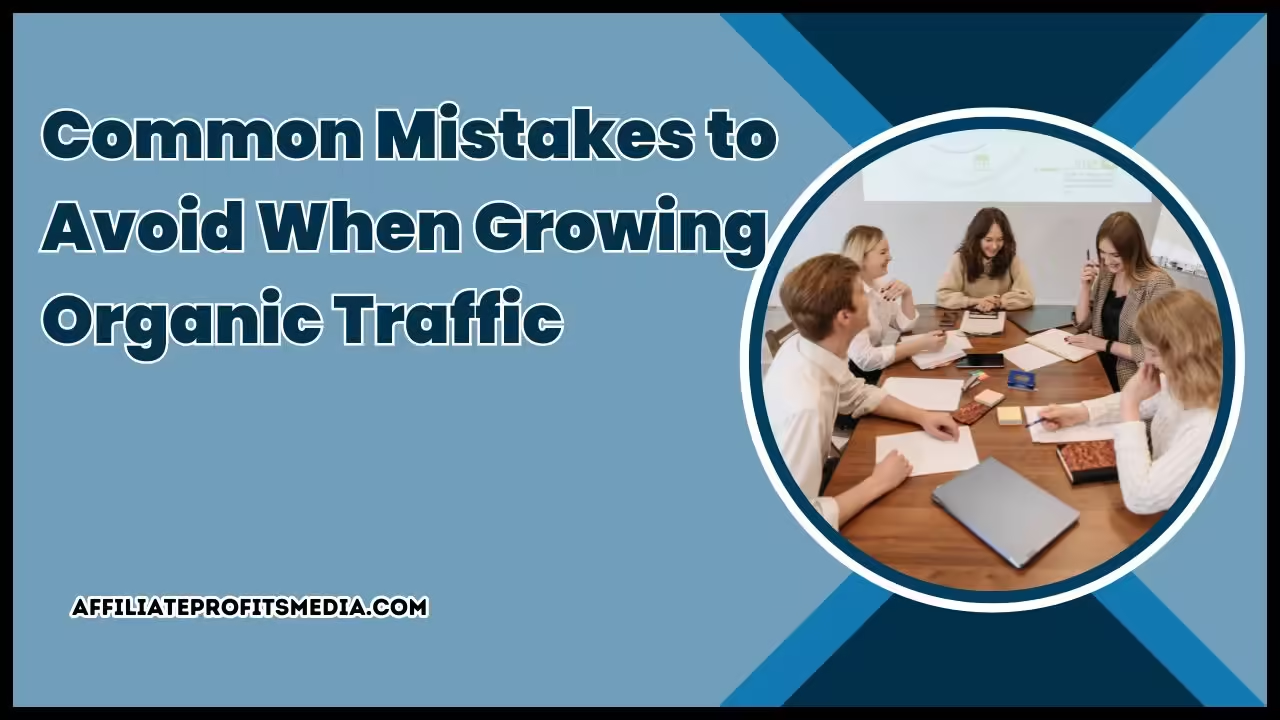Growing organic traffic is a cornerstone of digital marketing, offering a cost-effective way to attract visitors and build brand authority. However, there are common pitfalls that can hinder your progress. Avoiding these mistakes will help you optimize your efforts and achieve better results.
>> Here’s the Proven Way to Make $100-$200 Daily with 0 Investment – Watch This FREE Video and Start Now >>

1. Neglecting Keyword Research
Keyword research is the foundation of any successful SEO strategy. Neglecting to identify and target the right keywords can lead to poor search engine rankings. Use tools like Google Keyword Planner, Ahrefs, or SEMrush to discover relevant keywords with a balance of search volume and competition. Ensure your content aligns with the search intent behind these keywords to attract the right audience.
2. Overlooking On-Page SEO (Organic Traffic)
On-page SEO is crucial for ensuring that your content is easily understandable by search engines. Common mistakes include ignoring meta tags, not optimizing headers, and neglecting to use alt text for images. Implement best practices by including relevant keywords in titles, meta descriptions, and throughout the content. Properly formatted headings and descriptive image alt texts also enhance your SEO efforts.
3. Producing Low-Quality Content
Quality content is essential for attracting and retaining visitors. Content that is poorly written, irrelevant, or lacks depth will not engage your audience or rank well on search engines. Focus on creating valuable, informative, and well-researched content that addresses your audience’s needs. Use clear, engaging language and support your points with data and examples.
4. Ignoring Mobile Optimization (Organic Traffic)
With the increasing use of mobile devices, ensuring that your website is mobile-friendly is vital. A site that is not optimized for mobile can lead to a poor user experience and lower search engine rankings. Use responsive design to ensure your website adjusts to various screen sizes and test it on multiple devices to confirm usability.
5. Neglecting User Experience (UX)
User experience plays a significant role in organic traffic growth. Poor navigation, slow loading times, and intrusive pop-ups can frustrate users and drive them away. Focus on creating a seamless user experience with intuitive navigation, fast-loading pages, and a clean, user-friendly design. Regularly test your site to identify and fix any UX issues.
6. Failing to Build Quality Backlinks (Organic Traffic)
Backlinks from reputable sites signal to search engines that your content is credible and valuable. However, not all backlinks are equal. Avoid using low-quality or spammy link-building tactics, as these can harm your site’s reputation. Instead, focus on earning backlinks through high-quality content, guest blogging, and building relationships with industry influencers.
7. Ignoring Technical SEO
Technical SEO is the backbone of a well-optimized website. Issues such as broken links, duplicate content, and poor site architecture can negatively impact your search rankings. Regularly audit your site for technical problems and address them promptly. Tools like Screaming Frog or Google Search Console can help identify and resolve technical SEO issues.
8. Lack of Consistent Content Updates
The digital landscape is constantly evolving, and so should your content. Posting outdated information can lead to lower engagement and reduced search engine rankings. Develop a content calendar to ensure you regularly update your blog and website with fresh, relevant content. Stay informed about industry trends and adapt your content strategy accordingly.
>> Here’s the Proven Way to Make $100-$200 Daily with 0 Investment – Watch This FREE Video and Start Now >>
Neglecting Keyword Research
Keyword research is crucial for effective SEO. Ignoring it can severely limit your site’s visibility and traffic. Here’s why proper keyword research matters:
- Targeting the Right Audience: Identifying relevant keywords ensures you’re reaching your ideal audience.
- Improving Search Rankings: Using well-researched keywords helps your pages rank higher in search results.
- Enhancing Content Relevance: Keywords guide content creation, making it more relevant to what users are searching for.
- Competitor Insights: Research reveals what keywords your competitors are targeting and how you can differentiate.
- Optimizing Paid Campaigns: Keywords are also vital for effective PPC advertising.
- Avoiding Keyword Stuffing: Proper research prevents overuse of keywords, ensuring a natural, readable content flow.
Effective keyword research is the cornerstone of successful SEO. It ensures your content meets user intent, boosts search rankings, and enhances overall site performance.
Overlooking On-Page SEO (Organic Traffic)
On-page SEO is essential for boosting your website’s search visibility. Neglecting it can hinder your site’s performance. Here’s why on-page SEO matters:
- Improved Search Rankings: Proper optimization of titles, headers, and meta descriptions helps search engines understand your content.
- Enhanced User Experience: Clear headings and a well-structured layout make your content easier to read and navigate.
- Better Keyword Integration: Strategic keyword placement in content improves relevance and searchability.
- Increased Click-Through Rates: Optimized meta descriptions and title tags attract more clicks from search results.
- Boosted Mobile Friendliness: Responsive design and fast loading times improve user experience across devices.
Ignoring on-page SEO can limit your site’s potential. By optimizing key elements, you enhance visibility, user experience, and search rankings.
Producing Low-Quality Content
High-quality content is vital for online success. Producing low-quality content can damage your site’s reputation and effectiveness. Here’s why it’s crucial to focus on quality:
- Engagement: Well-researched, valuable content keeps readers engaged and encourages them to stay longer.
- Search Rankings: Search engines favor high-quality content, which can improve your rankings and visibility.
- Credibility: Authoritative, well-written content builds trust with your audience and establishes your site as a reliable source.
- User Retention: High-quality content encourages repeat visits and fosters loyalty.
- Shareability: Valuable content is more likely to be shared on social media, increasing your reach.
- Conversion Rates: Engaging, informative content can drive actions, such as purchases or sign-ups.
Focusing on quality content is essential for attracting and retaining visitors, boosting search rankings, and building credibility.
Ignoring Mobile Optimization (Organic Traffic)
Mobile optimization is crucial for a positive user experience and search engine performance. Neglecting this aspect can harm your website’s effectiveness. Here’s why mobile optimization is essential:
- User Experience: A mobile-friendly site ensures smooth navigation and readability on smartphones and tablets.
- Search Rankings: Search engines prioritize mobile-optimized sites, impacting your rankings on mobile search results.
- Increased Traffic: A mobile-responsive design attracts and retains more visitors from mobile devices.
- Reduced Bounce Rates: Proper optimization prevents users from leaving your site due to poor mobile usability.
- Enhanced Engagement: A seamless mobile experience leads to higher engagement and longer time spent on your site.
Mobile optimization is key to maintaining user satisfaction and search visibility. Ensure your site is mobile-friendly to enhance performance and user engagement.
>> Here’s the Proven Way to Make $100-$200 Daily with 0 Investment – Watch This FREE Video and Start Now >>
Neglecting User Experience (UX)
User experience (UX) is crucial for retaining visitors and improving site performance. Neglecting UX can negatively impact your website’s effectiveness. Here’s why prioritizing UX is important:
- Enhanced Navigation: Clear, intuitive navigation helps users find what they need quickly and easily.
- Reduced Bounce Rates: A well-designed site keeps visitors engaged and prevents them from leaving prematurely.
- Improved Load Times: Faster loading pages enhance user satisfaction and encourage longer visits.
- Increased Conversions: A user-friendly design leads to higher conversion rates, such as sign-ups or purchases.
- Positive Brand Perception: A seamless UX builds trust and enhances your brand’s reputation.
Focusing on user experience is essential for maintaining visitor engagement and optimizing site performance. Prioritize UX to improve satisfaction and achieve better results.
Failing to Build Quality Backlinks (Organic Traffic)
Building quality backlinks is crucial for improving your site’s authority and search rankings. Neglecting this can limit your SEO success. Here’s why quality backlinks matter:
- Enhanced Credibility: High-quality backlinks from reputable sites boost your site’s authority and trustworthiness.
- Improved Search Rankings: Search engines use backlinks as a ranking factor; more quality links often lead to higher positions.
- Increased Referral Traffic: Quality backlinks drive targeted traffic from other sites to yours.
- Competitive Edge: Effective backlink strategies can give you an advantage over competitors with fewer or lower-quality links.
- Brand Visibility: Backlinks from well-regarded sites increase your brand’s visibility and exposure.
Building quality backlinks is essential for SEO success. Focus on acquiring reputable links to enhance credibility, improve rankings, and drive traffic.
Ignoring Technical SEO
Technical SEO is foundational for a well-optimized website. Ignoring it can significantly impact your site’s performance and search rankings. Here’s why technical SEO is crucial:
- Improved Crawlability: Proper technical SEO ensures search engines can effectively crawl and index your site.
- Enhanced Site Speed: Optimization techniques like caching and compression improve page load times, boosting user experience.
- Mobile Friendliness: Ensuring your site is mobile-friendly is essential as search engines prioritize mobile-optimized pages.
- Fixing Broken Links: Regular audits to fix broken links and redirects prevent negative impacts on user experience and SEO.
- Secure Site: Implementing HTTPS enhances security and is favored by search engines.
Neglecting technical SEO can hinder your site’s search performance and user experience. Prioritize technical aspects to ensure optimal site functionality and rankings.
Lack of Consistent Content Updates
Regular content updates are vital for maintaining and improving your website’s performance. Failing to update content consistently can lead to several issues. Here’s why staying current matters:
- Search Engine Rankings: Fresh content signals to search engines that your site is active, which can improve rankings.
- User Engagement: Regular updates keep your audience engaged and returning for new information.
- Relevance: Updating content ensures it remains relevant and accurate, meeting current user needs and trends.
- Authority Building: Consistent content updates help establish your site as a trusted authority in your field.
- Reduced Bounce Rates: New content can attract and retain visitors, reducing bounce rates.
- Improved Conversion Rates: Engaging and relevant content can drive more conversions and actions from visitors.
Consistent content updates are crucial for SEO, user engagement, and maintaining relevance. Regularly refreshing your site helps ensure continued success and visibility.
Conclusion (Organic Traffic)
Avoiding these common mistakes is key to successfully growing organic traffic. By focusing on effective keyword research, optimizing on-page SEO, producing high-quality content, and maintaining a user-friendly experience, you can enhance your site’s visibility and attract a steady flow of visitors. Stay proactive in addressing technical issues and updating your content to keep up with the ever-changing digital landscape.
>> Here’s the Proven Way to Make $100-$200 Daily with 0 Investment – Watch This FREE Video and Start Now >>
Thank you for taking the time to read my article “Common Mistakes to Avoid When Growing Organic Traffic”, hope it helps!













